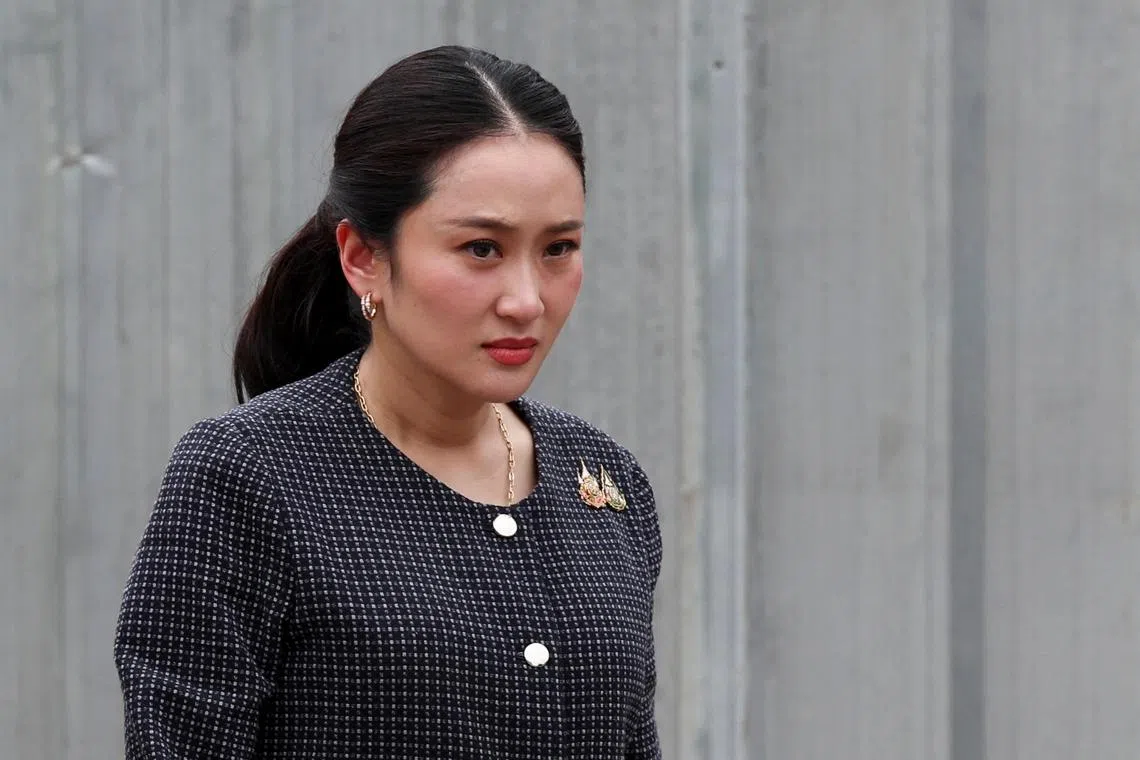Thailand PM says prepared to deal with US tariffs, plans bilateral talks
Sign up now: Get insights on Asia's fast-moving developments

Thai Prime Minister Paetongtarn Shinawatra said that the South-east Asian country would hold talks with the US to lower the levy.
PHOTO: REUTERS
BANGKOK – Thailand is prepared to deal with the fallout of the 36 per cent so-called reciprocal tariff
The ministries of finance and commerce will take the lead in devising a strategy to deal with the impact on the country’s manufacturers and exporters, Ms Paetongtarn told reporters on April 3.
The government has put in place measures to support, remedy and alleviate the impact on Thai exporters whose main market is the US, she said in a separate statement.
“Thailand has signalled its readiness to discuss with the US government at the first opportunity to adjust the trade balance to be fair to both the parties,” Ms Paetongtarn said.
At the same time, Thai exporters should look for new markets with potential to reduce the risk of relying on a single market, she said.
Thailand’s trade surplus with the US totalled US$45 billion in 2024, according to the Office of the US Trade Representative.
The country adopted a wait-and-see strategy in the run-up to the tariff announcement and promised to step up imports of energy and food products to cut the trade surplus.
The US is Thailand’s largest export market with electronics, machinery and agricultural products topping the list of goods.
Thailand’s stocks and currency slumped on concerns that the tariff will hurt growth prospects of South-east Asia’s second-largest economy, where annual merchandise exports equal almost two-thirds of its gross domestic product of about US$520 billion (S$697 billion).
Ms Paetongtarn said the average Thai tariff on US goods was 9 per cent and the Trump administration may have factored in several non-tariff barriers to trade in imposing such a steep levy on Thailand.
A government panel set up before US President Donald Trump assumed the office has prepared a “proposal to adjust the trade balance with the US that is substantial enough to give the US an incentive to enter the negotiation process with Thailand” with the least impact on farmers, consumer and entrepreneurs, she said.
The premier said Thailand may also use this opportunity to adjust its production structure, reduce costs and increase the long-term competitiveness of some industries.
The nation also has the potential to be one of the “friend-shoring” countries for the US as it can import agriculture products to process and re-export, she said.
The prime minister also touted Thailand’s position as a major producer of hard disk drives and electronic components used in data centres and AI infrastructure as an area for greater bilateral cooperation.
Shares of Thai electronics manufacturers including Delta Electronics (Thailand) Pcl and Cal-Comp Electronics (Thailand) Pcl were among the biggest losers on the Thai stock market on April 3.
Thailand’s private sector remained largely unfazed by the higher-than-expected tariff, while urging the government to hold speedy negotiations.
“Don’t panic as other countries are also facing higher tariffs,” Thai Chamber of Commerce chairman Poj Aramwattananont said. “The US will also have some impact from this, as they still can’t produce to replace the imports fast enough.” BLOOMBERG


